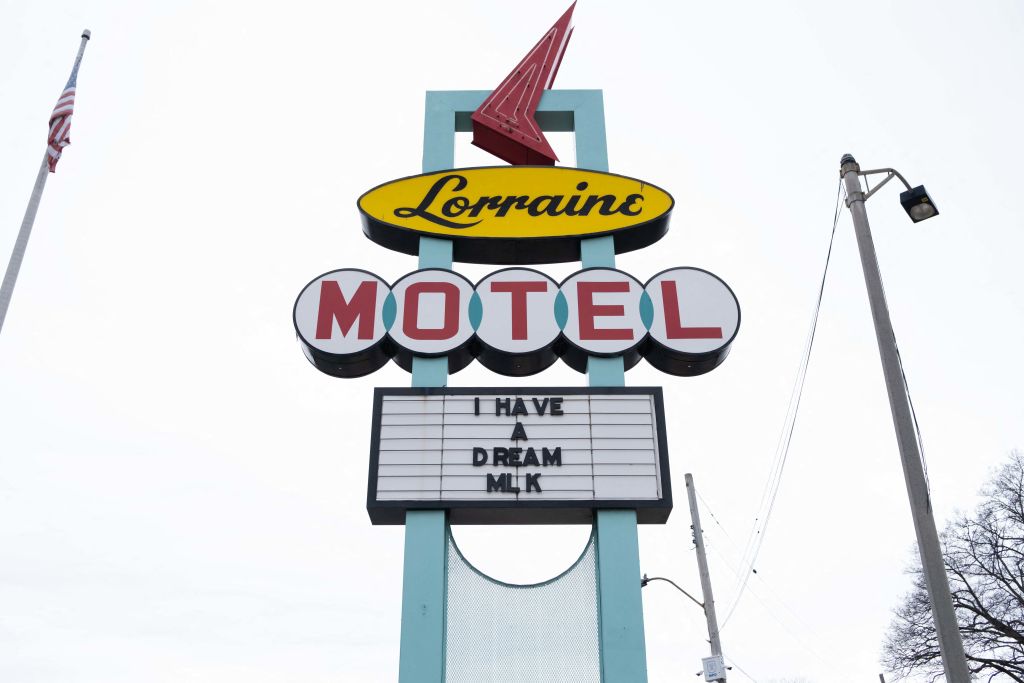Breaking Down The Conspiracy Theories Surrounding The Assassination Of MLK
Source: SETH HERALD / Getty
When someone the world loves is tragically taken away, people need answers and if they don’t get those answers, conspiracy theories begin to take form. On this episode of Black Folklore, we dive into the complex and fascinating MLK conspiracies surrounding the assassination of Martin Luther King Jr.
After King was killed MLK conspiracy theories centered around his death began to pick up steam, but every great puzzle starts with the first piece, so let’s go back to the beginning.
On April 4, 1968, Martin Luther King Jr. was shot and killed while standing on the balcony of his second-floor hotel room at the Lorraine Motel in Memphis, Tennessee. News of his death shook the Black community at its core, resulting in violence erupting in more than 125 American cities across 29 states. According to the NMAAHC, after King’s assassination nearly 50,000 federal troops occupied America’s urban areas. Thirty-nine people were killed and 3,500 injured.
On March 10, 1969, James Earl Ray confessed to the murder of Martin Luther King Jr. and was sentenced to 99 years in prison.
Three days later, Ray recanted his guilty plea, claiming he was coerced into confessing and the MLK conspiracy theories craze began. It also didn’t help that Ray tried to escape prison in 1977, still claiming he did not kill King.
Source: Bettmann / Getty
Was James Earl Ray a scapegoat for a more powerful and nefarious organization aimed at seeing the downfall of America’s most prominent Black leader? The evidence pointed to Ray, but public sentiment wanted more answers.
Below are four of the most compelling MLK conspiracy theories. It’s worth noting that from a legal perspective, the case in the death of King has remained closed with most evidence still pointing to Ray as King’s killer, but some theories still linger within the Black community.
The CIA connection
One of the early MLK conspiracy theories centered around government involvement in King’s death.
Source: SETH HERALD / Getty
The iconic photo that was taken right after King’s death shows most of King’s staffers pointing in the direction where the shots came, except for one man who was kneeling over King. It was later revealed that the man kneeling over King when he died was an undercover cop named Marrell McCollough, who was assigned to infiltrate a black power youth group. McCollough would also later work for the CIA, which added fuel to this conspiracy. In 1978, McCollough testified in the House Assassinations Committee hearings that after the shots, he ran up to the balcony to administer first aid. McCollough also passed a lie detector test clearing him of involvement in King’s death.
Man in the bushes
Solomon Jones, the volunteer driver for King, initially told police he saw a man running away in the brush opposite the motel. His account fueled the flames of MLK conspiracy theories more than any other account. But all of King’s closest aids with interviewed by police and no other person saw a man running from the bushes. The U.S. Justice Department later said Jones probably mistook officers running around as a man fleeing the scene.
James Earl Ray was scapegoated
Source: Bettmann / Getty
After James Earl Ray recanted his story of events he claimed a mysterious man named “Raoul” whom he said he met in a Montreal bar in the summer of 1967 framed him for the murder of King. Ray claimed Raoul told him to buy a rifle and told him to rent a room at the Bessie Brewer’s Boarding House, which was across the street from the hotel where King was killed. Investigators couldn’t find a single witness to place Ray with Raoul and believe “Raoul” phantom creation from Ray’s mind.
Organized Crime was involved
In 1993, 25 years after the murder, a man named Loyd Jowers claimed that he participated in a conspiracy to kill Dr. King, along with an alleged Mafia figure, Memphis police officers, and a man named Raoul.
In 1998, the King family filed a wrongful death lawsuit against Jowers and “other unknown co-conspirators” for the murder of King. A jury found that Jowers did participate in a conspiracy to kill King, but in 2000, the DOJ released a 150-page report denying allegations.
Source: Bettmann / Getty
The questions surrounding Martin Luther King Jr.’s assassination will never truly be answered, but as we navigate King’s legacy, lets not forget the stories of the past and how tragic events create holes in the hearts of many that justice doesn’t always fill.
SEE ALSO:
The Day Black Boys Burned: Uncovering The 1959 Fire At The Negro Boys Industrial School
The Untold Story Of The Black Pilgrims Of Plymouth Colony
The post Breaking Down The Conspiracy Theories Surrounding The Assassination Of MLK appeared first on NewsOne.

